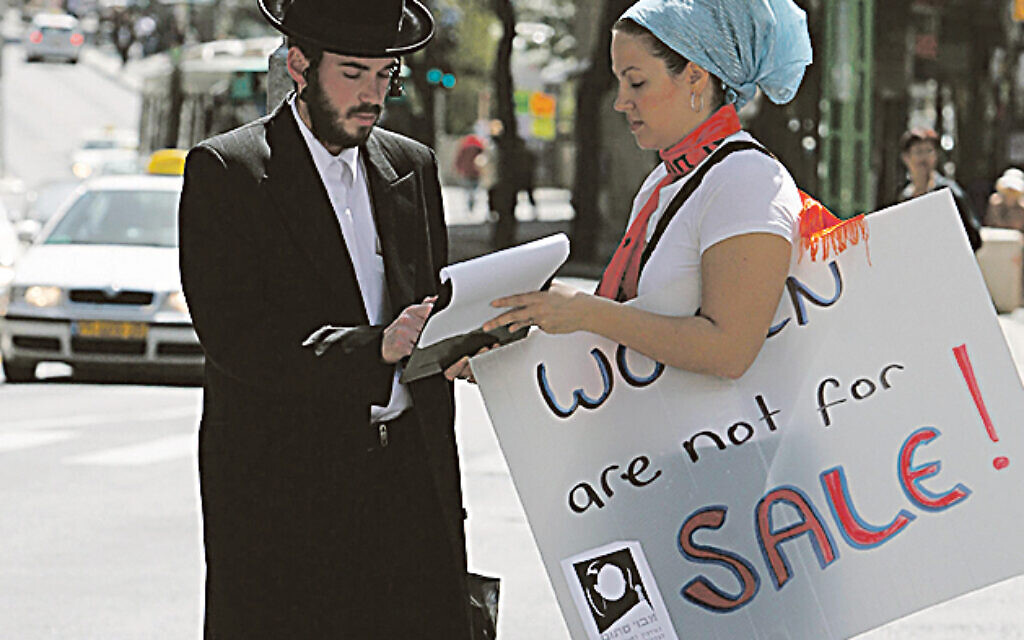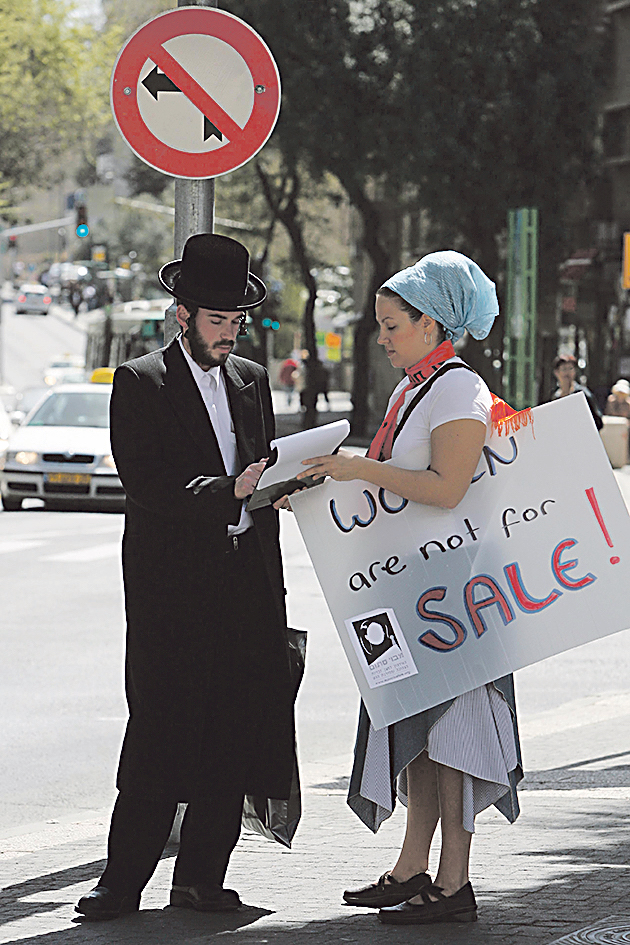Religious divorce refusal can now be recognised as a criminal offence
A husband who refuses a 'get' can now be viewed as exerting controlling and coercive behaviour, listed as a criminal offence under the Serious Crime Act.

Husbands who refuse their wives a religious divorce are more likely to be prosecuted following “momentous” changes to the government’s Domestic Abuse Bill.
A man who refuses a get will now be clearly recognised as exerting controlling and coercive behaviour, which is listed as a criminal offence under the Serious Crime Act of 2015.
If found guilty, an offender could face up to five years in jail.
Get The Jewish News Daily Edition by email and never miss our top stories Free Sign Up
While get refusal could previously have been considered a criminal offence under the 2015 Act, experts say the law was ambiguous and had yet to be fully tested in court. New amendments to the Act, combined with the Domestic Abuse Bill, have now eradicated any doubt.
Experts say that by adding to and clarifying existing legislation it will now be easier to take action against perpetrators. Joanne Greenaway, former get case director at the London Beth Din, said she hopes that “the new Domestic Abuse Bill and working together with the Batei Din who look after the Get cases, we see additional protections for these victims of abuse”.
Baroness Altmann, who is part of a cross-party group of Jewish peers that has been working to implement this in law, told Jewish News that this was a “momentous development in our quest to protect British people whose partners refuse to give them the get. We have long wanted to see this issue addressed for the women affected and try and free them so they can get on with their lives”. She added: “Finally, a Jewish wife can get support to stand up and say this is not OK.”
Previously, there were question marks over whether an offence could be coercive if a couple was not cohabiting in an “intimate relationship”.
In some cases of get refusal, victims are no longer living with their partner and may have divorced under secular law. The ambiguities have meant that a husband can argue that as he is longer living with with his wife, his behaviour cannot be deemed coercive.
Greenaway said: “Thanks to the Serious Crime Act 2015, two prosecutions have already been brought which have led to the freeing of women in very difficult circumstances of get refusal. This was despite uncertainty
as to whether the provisions related to couples post-separation.”
This tightening of the definition will bring clarity to enable more people to use this avenue with confidence and more quickly move on with their lives.”
This week a review into controlling or coercive behaviour conducted as part of the Domestic Abuse Bill, which enters its report stage next week, was published. It clarified that someone can be a victim of coercive behaviour even if the couple no longer live together.

CEO of Jewish Women’s Aid Naomi Dickson said she is “so pleased” this kind of abuse is being acknowledged. “Domestic abuse does not end when a woman manages to leave the home she shares with her perpetrator. Within the Jewish community, post-separation abuse can include get refusal, when a couple are still married in the eyes of Jewish law,” she said.
Rabbanit Ramie Smith, who in 2020 co-founded GETTOUT UK, a charity offering support and legal advice to agunot, says the withholding of a get is often used as a way for a husband to punish a wife or as a means of extortion when things don’t go their way in court.
“We have seen men asking women to accept less money or less property in order to get the get. To say, ‘I won’t give you your freedom unless you take less money than the court has ordered you’ is a clear manipulation and a clear act of control.”
Now, campaigners like Baroness Altmann say the report has shown “beyond any doubt that unreasonable get refusal is a crime” and so these tactics will no longer be permissible.
But rather than seeing anyone go to jail, Altmann wants the report to act as a deterrent to “any husband who thinks he may find a loophole in British law to withhold a get”.

She is hopeful that these new definitions will “pave the way for a significant mindset change on the part of a Jewish husband. Just as no one would say it OK for a husband to tie his wife up and keep her hostage for days on end, now, too they will see that it is simply not decent, not right, and in fact criminal to refuse a get,” she says.

According to Jewish law, a woman may only be considered divorced halachically once she receives a get from her husband. Women whose husbands refuse a get are considered agunot (chained) and are unable to remarry.
However, for a get to be deemed kosher, it must be granted by the husband of his free will. This means it is against Jewish law for either a secular court or the Beth Din to force a husband to grant his wife a get.
Rifka Meyer, who was an agunah before receiving her get and who co-founded GETTOUT UK, says: “Just knowing that lawyers and civil courts can summon [husbands], and they can’t run or get away with it will make a huge difference to the women we are working with.”
- If you, or someone you know, has been affected by domestic abuse, you can contact the JWA helpline on 0808 801 0500 or see gettoutuk.org

Thank you for helping to make Jewish News the leading source of news and opinion for the UK Jewish community. Today we're asking for your invaluable help to continue putting our community first in everything we do.
For as little as £5 a month you can help sustain the vital work we do in celebrating and standing up for Jewish life in Britain.
Jewish News holds our community together and keeps us connected. Like a synagogue, it’s where people turn to feel part of something bigger. It also proudly shows the rest of Britain the vibrancy and rich culture of modern Jewish life.
You can make a quick and easy one-off or monthly contribution of £5, £10, £20 or any other sum you’re comfortable with.
100% of your donation will help us continue celebrating our community, in all its dynamic diversity...
Engaging
Being a community platform means so much more than producing a newspaper and website. One of our proudest roles is media partnering with our invaluable charities to amplify the outstanding work they do to help us all.
Celebrating
There’s no shortage of oys in the world but Jewish News takes every opportunity to celebrate the joys too, through projects like Night of Heroes, 40 Under 40 and other compelling countdowns that make the community kvell with pride.
Pioneering
In the first collaboration between media outlets from different faiths, Jewish News worked with British Muslim TV and Church Times to produce a list of young activists leading the way on interfaith understanding.
Campaigning
Royal Mail issued a stamp honouring Holocaust hero Sir Nicholas Winton after a Jewish News campaign attracted more than 100,000 backers. Jewish Newsalso produces special editions of the paper highlighting pressing issues including mental health and Holocaust remembrance.
Easy access
In an age when news is readily accessible, Jewish News provides high-quality content free online and offline, removing any financial barriers to connecting people.
Voice of our community to wider society
The Jewish News team regularly appears on TV, radio and on the pages of the national press to comment on stories about the Jewish community. Easy access to the paper on the streets of London also means Jewish News provides an invaluable window into the community for the country at large.
We hope you agree all this is worth preserving.
-
By Brigit Grant
-
By Laurent Vaughan - Senior Associate (Bishop & Sewell Solicitors)
-
By Laurent Vaughan - Senior Associate (Bishop & Sewell Solicitors)
-
By Laurent Vaughan - Senior Associate (Bishop & Sewell Solicitors)
-
By Laurent Vaughan - Senior Associate (Bishop & Sewell Solicitors)





















